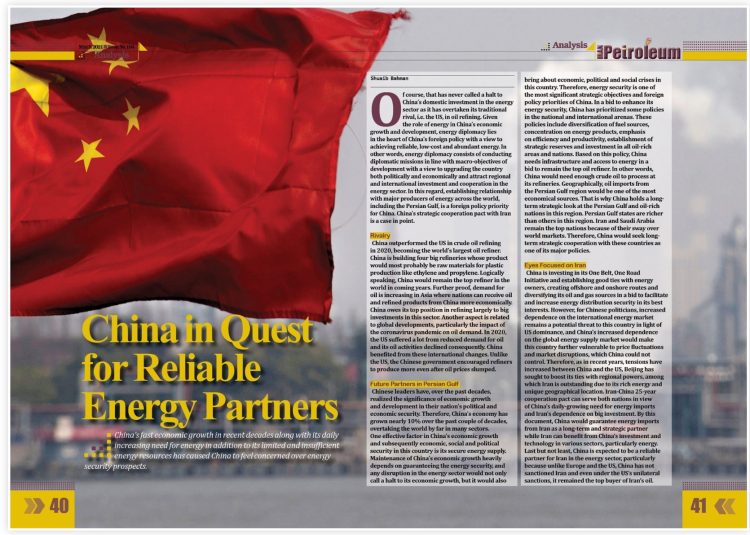Shuaib Bahman
China’s fast economic growth in recent decades along with its daily increasing need for energy in addition to its limited and insufficient energy resources has caused China to feel concerned over energy security prospects.
Of course, that has never called a halt to China’s domestic investment in the energy sector as it has overtaken its traditional rival, i.e. the US, in oil refining. Given the role of energy in China’s economic growth and development, energy diplomacy lies in the heart of China’s foreign policy with a view to achieving reliable, low-cost and abundant energy. In other words, energy diplomacy consists of conducting diplomatic missions in line with macro-objectives of development with a view to upgrading the country both politically and economically and attract regional and international investment and cooperation in the energy sector. In this regard, establishing relationship with major producers of energy across the world, including the Persian Gulf, is a foreign policy priority for China. China’s strategic cooperation pact with Iran is a case in point.
Rivalry
China outperformed the US in crude oil refining in 2020, becoming the world’s largest oil refiner. China is building four big refineries whose product would most probably be raw materials for plastic production like ethylene and propylene. Logically speaking, China would remain the top refiner in the world in coming years. Further proof, demand for oil is increasing in Asia where nations can receive oil and refined products from China more economically.
China owes its top position in refining largely to big investments in this sector. Another aspect is related to global developments, particularly the impact of the coronavirus pandemic on oil demand. In 2020, the US suffered a lot from reduced demand for oil and its oil activities declined consequently. China benefited from these international changes. Unlike the US, the Chinese government encouraged refiners to produce more even after oil prices slumped.
Future Partners in Persian Gulf
Chinese leaders have, over the past decades, realized the significance of economic growth and development in their nation’s political and economic security. Therefore, China’s economy has grown nearly 10% over the past couple of decades, overtaking the world by far in many sectors. One effective factor in China’s economic growth and subsequently economic, social and political security in this country is its secure energy supply. Maintenance of China’s economic growth heavily depends on guaranteeing the energy security, and any disruption in the energy sector would not only call a halt to its economic growth, but it would also bring about economic, political and social crises in this country. Therefore, energy security is one of the most significant strategic objectives and foreign policy priorities of China. In a bid to enhance its energy security, China has prioritized some policies in the national and international arenas. These policies include diversification of fuel sources, concentration on energy products, emphasis on efficiency and productivity, establishment of strategic reserves and investment in all oil-rich areas and nations.
Based on this policy, China needs infrastructure and access to energy in a bid to remain the top oil refiner. In other words, China would need enough crude oil to process at its refineries. Geographically, oil imports from the Persian Gulf region would be one of the most economical sources. That is why China holds a long-term strategic look at the Persian Gulf and oil-rich nations in this region. Persian Gulf states are richer than others in this region. Iran and Saudi Arabia remain the top nations because of their sway over world markets. Therefore, China would seek long-term strategic cooperation with these countries as one of its major policies.
Eyes Focused on Iran
China is investing in its One Belt, One Road Initiative and establishing good ties with energy owners, creating offshore and onshore routes and diversifying its oil and gas sources in a bid to facilitate and increase energy distribution security in its best interests. However, for Chinese politicians, increased dependence on the international energy market remains a potential threat to this country in light of US dominance, and China’s increased dependence on the global energy supply market would make this country further vulnerable to price fluctuations and market disruptions, which China could not control.
Therefore, as in recent years, tensions have increased between China and the US, Beijing has sought to boost its ties with regional powers, among which Iran is outstanding due to its rich energy and unique geographical location. Iran-China 25-year cooperation pact can serve both nations in view of China’s daily-growing need for energy imports and Iran’s dependence on big investment. By this document, China would guarantee energy imports from Iran as a long-term and strategic partner while Iran can benefit from China’s investment and technology in various sectors, particularly energy.
Last but not least, China is expected to be a reliable partner for Iran in the energy sector, particularly because unlike Europe and the US, China has not sanctioned Iran and even under the US’s unilateral sanctions, it remained the top buyer of Iran’s oil.








